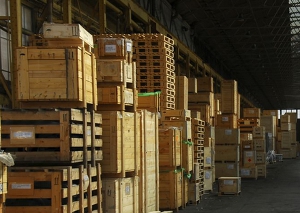Federal Way, Wash. - Pacific Lumber Inspection Bureau has agreed to an out of court settlement in a trademark infringement claim the organization had made against a company in the southern U.S. for unauthorized use of a certification stamp. The confidential settlement, valued in the six-figure range, was agreed to by both parties before a lawsuit was filed.
 According to PLIB, the case involved unauthorized use of the trademarked stamp that identifies dunnage material certified under the International Plant Protection Convention’s (IPPC) International Standard for Phytosanitary Measure No. 15 (ISPM 15). The purpose of the ISPM 15 program is to protect the health of the world’s forests by restricting the inadvertent transportation of forest pests in the wood used for packaging and dunnage in international shipments. When pests gain a foothold in areas where there are few, if any, natural predators, the results can be catastrophic.
According to PLIB, the case involved unauthorized use of the trademarked stamp that identifies dunnage material certified under the International Plant Protection Convention’s (IPPC) International Standard for Phytosanitary Measure No. 15 (ISPM 15). The purpose of the ISPM 15 program is to protect the health of the world’s forests by restricting the inadvertent transportation of forest pests in the wood used for packaging and dunnage in international shipments. When pests gain a foothold in areas where there are few, if any, natural predators, the results can be catastrophic.
“All of the certification programs that our trademarked stamps represent are important to human safety and welfare or, as in this case, the health of our world’s forests,” said Jeff Fantozzi, the PLIB’s President, “As such, we take trademark infringement seriously and will aggressively pursue all violators.”
In addition to the ISPM 15 certification program, PLIB provides lumber grade marking services and pellet fuel inspection services along with a variety of other accreditation services used in the lumber and wood products industry.
This particular case involved a Louisiana company involved in exporting to overseas markets. The company learned that the dunnage (lumber used to fill voids in the cargo area of ships) it was using required ISPM 15 certification. Rather than subscribe to a certification service to provide the necessary inspections and certification stamps, PLIB believes that the company instead chose to illegally reproduce the PLIB stamp and use it to gain access to overseas markets. The company was found to be using the unauthorized stamps at multiple facilities. The settlement amount was significantly more than the company would have paid had it subscribed to a certification service.
The trademark violation was discovered when another inspection agency that operates in the South conducted a routine check at a local stamp making facility in the region, a stamp company PLIB does not work with. “When it comes to protecting trademarks and the integrity of our certification programs, we inspection services have each others’ backs,” Fantozzi said. “We do not operate in the Southeastern region where the fraud took place, but another agency that does found the fraud and alerted us. Violators can be sure that there are a lot of eyes out there looking for improprieties.”
Unauthorized reproduction of the certification stamps is blatantly illegal under the Lanham Act, the main federal statute addressing such cases. Successful plaintiffs may be awarded injunctions against further infringements as well as monetary damages including the defendant’s profits as well as damages sustained by the plaintiff. The Lanham Act allows damages to be trebled when the facts show a defendant acted in bad faith. “Clearly the willful use of an unauthorized certification stamp could be seen as an act in bad faith,” Fantozzi said.
Beyond the financial impact of a trademark action, guilty parties also open themselves up to further liabilities. “The ISPM certification stamp is used as a mechanism to protect forests from destructive pest infestations,” Fantozzi explained. “It is not uncommon for foreign plant health authorities to deny entry or even destroy entire shipments of goods when violations are discovered. Illegal use of an internationally recognized certification mark would raise all kinds of red flags with government authorities both here and in the receiving country. It’s not out of the question to think a foreign government might go after violators for damages as the result of mis-represented lumber.”
Certification agencies have become more diligent in their efforts to spot violators and this case is one example. The increased attention has, in fact, uncovered a number of additional cases that are currently being investigated.
According to PLIB, violators don’t just have the various inspection agencies to worry about. “The federal government could also become involved,” Fantozzi said. “Our programs are ultimately governed by the US Department of Agriculture and the US Department of Commerce. Those agencies take their jobs seriously.”
Source: Pacific Lumber Inspection Bureau





Have something to say? Share your thoughts with us in the comments below.